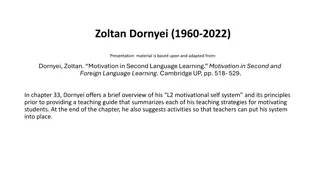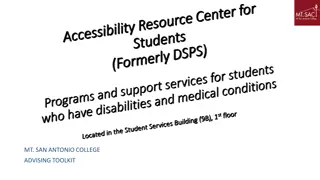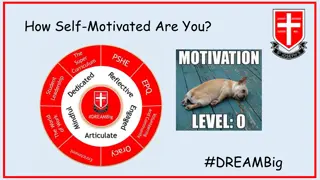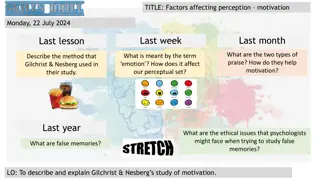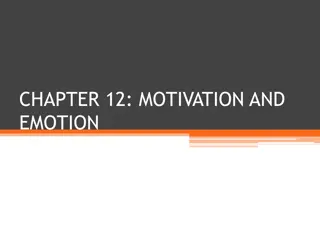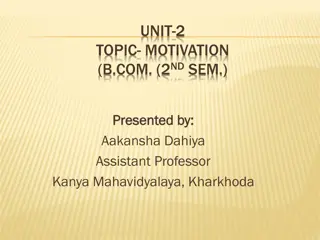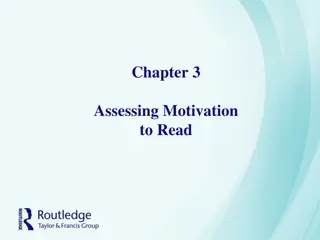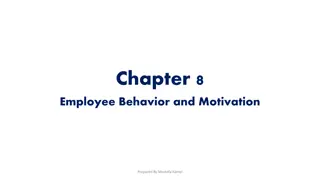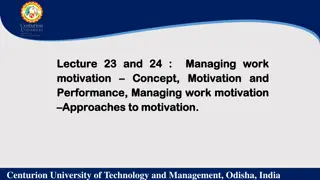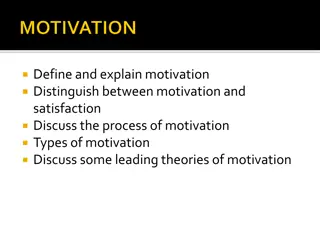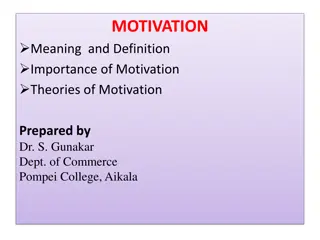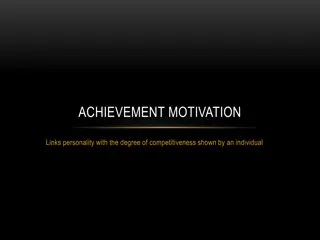Understanding Motivation for Academic Success
Explore the importance of motivation in academic pursuits, as explained by guest speaker Hlumelo Sonjani. Learn about the concepts of intrinsic and extrinsic motivation, the impact of motivation on learning effectiveness, and strategies to stay motivated in challenging situations. Gain insights into setting realistic goals, managing anxiety, and maximizing success through motivation.
Download Presentation

Please find below an Image/Link to download the presentation.
The content on the website is provided AS IS for your information and personal use only. It may not be sold, licensed, or shared on other websites without obtaining consent from the author. Download presentation by click this link. If you encounter any issues during the download, it is possible that the publisher has removed the file from their server.
E N D
Presentation Transcript
MOTIVATION By guest speaker, Hlumelo Sonjani (project coordinator of the Q1-3 Personal Mentorship Programme)
Introduction Introduction The presentation will be focusing on Motivation. During the course of your studies, lack of motivation might become a common challenge. And you will have to be able to deal with it. As a student, you are responsible for completing your studies independently and to the best of your ability. You need to understand what motivates you and how you can ensure you stay motivated, even when life seems difficult and unfair. Motivation affects your interest, ability and your level of success.
What is Motivation? What is Motivation? It is any influence that triggers, directs or maintains goal-directed behaviour (Hellriegel et al., 1999:462). It accounts for your intensity (how hard you try), direction (what you strive for, i.e. your goal) and persistence of effort (how long can you maintain your effort) toward obtaining a goal (Motivation, n.d.). It is not a personal trait and everyone is capable of being motivated. (It is rather a skill that can be learned). It fluctuates from situation to situation and over time. It is dependent on the learning goals you set and the method you choose to accomplish them. Your feelings of success or failure in the learning situation are emphasised through the goal- directed aspect of motivation. By knowing what motivates you, you become more in control of the activities and commitments that you take on. This knowledge will help you to understand why you do certain things, and what helps you to complete certain tasks. By relating things to your motivators, you can be more successful
Two primary types of motivation Two primary types of motivation 1. Intrinsic (internal) motivation And 2. Extrinsic (external) motivation
Learning and motivation Learning and motivation When you are motivated internally (intrinsically) it lasts longer and is more self- directive than external (extrinsic) motivation, which must be repeatedly reinforced by praise or concrete awards. Learning tends to be more effective when you experience feelings of satisfaction. When you are motivated to learn, you tend to find the learning activities more meaningful and therefore will benefit from them (Wlodkowski, 1994:4). For your learning to be effective, you need to be ready to learn, i.e. you must want to know something. The basic principle of learning is that success increases your level of motivation. To be successful, you need to have realistic goals. The process of setting goals demonstrates an intention to achieve, and this activates your learning from one day to the next. It also directs your activities toward the goal and offers you the opportunity to experience success. Your beliefs and behaviour regarding your learning can normally produce mild levels of anxiety, which you may need to manage and control, or overcome. However, you can also use this anxiety to motivate yourself.
Q 1 Q 1- -3 experiences 3 experiences Some of the experiences that I also faced as a Q1-3 student is where in our schools we would be taught English in our home language, no access to computer literacy programs and many other relevant resources. Now these students would come to a University learning environment that is English based, where most of the times lecturers would be rushing to finish the contents of the syllabus without giving attention to such students who are still facing language barrier issues. Additionally, it would be their first time interacting with a computer. In my own experience as a Q1-3 first year, I would take days to type an assignment, after first pen-writing it down. Entering the student portal and emails gave me anxiety attacks, these felt as highly complex systems with many things I never understood on the screen. Which ended me up failing my computer literacy program. Meanwhile, I was facing cultural shock of being in a totally different world. Coming from a township to a flamboyant, dynamic and advanced world was too overwhelming.
4. Attitude and motivation 4. Attitude and motivation Attitude refers to your mental focus on the world around you, which basically relates to your mental starting point for viewing life, people and the events in it. Your attitude influences the way you act and react to situations or people. Motivation measures the extent to which you accept responsibility for your studying, reading assignments and homework, etc. Together, attitude and motivation drive your learning and your desire to succeed and develop. By adopting a positive, winning attitude you can take any experience and turn it into a positive learning experience. Simply by choosing to have a positive attitude, you are choosing to be successful! (Chapman & McKnight, 2001; Testing criteria, n.d.). An important question arises: How will you sustain a positive attitude?
5. Increase your motivation 5. Increase your motivation You can choose/decide to work on your motivation. You need to take responsibility for your success and happiness. You do not need to wait for your environment to supply you with motivation, as you can generate motivation from within yourself. The learning process is an active process and occurs optimally when you are intrinsically motivated to engage with and assimilate the information. The same applies to developing yourself. However, sometimes you may feel unmotivated, for various reasons. I will share a handout after the presentation of how you can motivate yourself when you feel less motivated. Before I summarise, I want us to share various ways that we have used previously to self motivate.
Summary Summary Motivation is the drive that pushes you to achieve in combination with a positive attitude. There are two types of motivation, namely internal (intrinsic) and external (extrinsic) motivation. The basic difference between these two types of motivation lies in the source that energises you and directs your behaviour (Reeve, 1996). Your motivation level can influence your ability to learn. Edward Deci says that, For you to be motivated it is important to have both extrinsic motivation and intrinsic motivation. Thanks you!!!!

 undefined
undefined


